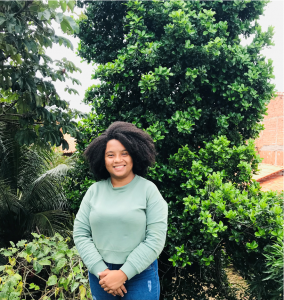Contributed by Apoliana da Conceição dos Santos
 With the support of travel funding of El Instituto, I attended and presented at the II Congresso Nacional de Linguística Aplicada (CONALA) & I Congresso Internacional de Linguagem, Literatura e Discurso (CILLID) in Maranhão, Brazil. My presentation, “XIX-Century Brazilian and Cuban Racial Realities: Aluísio Azevedo’s Mulatto and Manzano’s Autobiography of a Slave,” explored how both works reflect racial and social hierarchies in 19th-century Brazil and Cuba, particularly through the concept of social death and its role in shaping racial identity.
With the support of travel funding of El Instituto, I attended and presented at the II Congresso Nacional de Linguística Aplicada (CONALA) & I Congresso Internacional de Linguagem, Literatura e Discurso (CILLID) in Maranhão, Brazil. My presentation, “XIX-Century Brazilian and Cuban Racial Realities: Aluísio Azevedo’s Mulatto and Manzano’s Autobiography of a Slave,” explored how both works reflect racial and social hierarchies in 19th-century Brazil and Cuba, particularly through the concept of social death and its role in shaping racial identity.
This congress was an enriching experience, and among all levels of academic research presented, I was particularly impressed by the undergraduates. Unlike the U.S., undergraduate studies in Latin America span four years with fewer courses per semester, and witnessing young scholars present such rigorous work in an international setting was both nostalgic and inspiring.
The opening talk by Dr. Josimayre Novelli (UEM) on “Formação de professores de línguas: dilemas e perspectivas no contexto das TDIC e IA” was especially impactful. Her commitment to teacher education and deep understanding of Federal Public Universities in Brazil highlighted her dedication to her students’ professional development.
I attended a diverse range of presentations, including those in French, and from scholars affiliated with institutions in Germany, Chile, Austria, and the U.S., reinforcing the importance of global academic collaboration. One of the highlights was the closing keynote by Dr. Jerome Branche (University of Pittsburgh) on “Beyond Socialism or The Revolution Will Not Be Sacralized: Memory, Maroonage, and Animism in the Poetics of Jesus Cos Causse.” The Q&A session afterward, discussing Manzano, Césaire, and the Caribbean, provided invaluable insights for my research at ELIN.
This congress significantly contributed to my academic growth, deepening my understanding of transnational literary studies and shaping my thesis. Engaging with experts like Dr. Branche was particularly valuable in refining my work.
Attending CONALA & CILLID was one of the most intellectually stimulating experiences I have had. I am deeply grateful to Dr. Naiara Sales Araújo for organizing such an exceptional event that fostered rich academic exchange. I also appreciate the funding that enabled me to participate and share my research on an international stage.